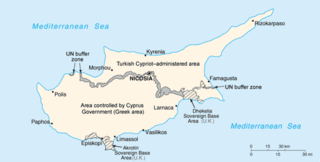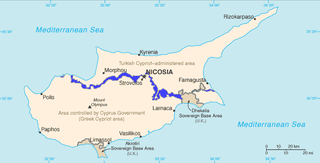
United Nations Security Council Resolution 422, adopted on December 15, 1977, noted a report of the Secretary-General that, due to the existing circumstances, the presence of the United Nations Peacekeeping Force in Cyprus would continue to be essential for a peaceful settlement. The Council expressed its concerns regarding actions which could heighten tensions, and asked the Secretary-General to report back again before May 31, 1978 to follow the implementation of the resolution.

United Nations Security Council Resolution 430, adopted on December 14, 1978, noted a report of the Secretary-General that, due to the existing circumstances, the presence of the United Nations Peacekeeping Force in Cyprus would continue to be essential for a peaceful settlement. The Council expressed its concerns regarding actions which could heighten tensions, and asked the Secretary-General to report back again before May 31, 1979 to follow the implementation of the resolution.

United Nations Security Council Resolution 482, adopted on 11 December 1980, noted a report of the Secretary-General that, due to the existing circumstances, the presence of the United Nations Peacekeeping Force in Cyprus (UNFICYP) would continue to be essential for a peaceful settlement. The Council expressed its desire for all parties to support the ten-point agreement for the resumption of intercommunal talks, and asked the Secretary-General to report back again before 31 May 1981 to follow the implementation of the resolution.

United Nations Security Council resolution 510, adopted unanimously on 15 June 1982, noted a report of the Secretary-General that, due to the existing circumstances, the presence of the United Nations Peacekeeping Force in Cyprus (UNFICYP) would continue to be essential for a peaceful settlement. The Council expressed its desire for all parties to support the ten-point agreement for the resumption of intercommunal talks, and asked the Secretary-General to report back again before 30 November 1982 to follow the implementation of the resolution.

United Nations Security Council resolution 526, adopted unanimously on 14 December 1982, noted a report of the Secretary-General that, due to the existing circumstances, the presence of the United Nations Peacekeeping Force in Cyprus (UNFICYP) would continue to be essential for a peaceful settlement. The Council expressed its desire for all parties to support the ten-point agreement for the resumption of intercommunal talks, and asked the Secretary-General to report back again before 31 May 1983 to follow the implementation of the resolution.

United Nations Security Council resolution 534, adopted unanimously on 15 June 1983, noted a report of the Secretary-General that, due to the existing circumstances, the presence of the United Nations Peacekeeping Force in Cyprus (UNFICYP) would continue to be essential for a peaceful settlement. The Council expressed its desire for all parties to support the ten-point agreement for the resumption of intercommunal talks, and asked the Secretary-General to report back again before 30 November 1983, to follow the implementation of the resolution.

United Nations Security Council resolution 544, adopted unanimously on 15 December 1983, noted a report of the Secretary-General that, due to the existing circumstances, the presence of the United Nations Peacekeeping Force in Cyprus (UNFICYP) would continue to be essential for a peaceful settlement. The Council expressed its desire for all parties to support the ten-point agreement for the resumption of intercommunal talks, and asked the Secretary-General to report back again before 31 May 1984, to follow the implementation of the resolution.

United Nations Security Council resolution 559, adopted unanimously on 14 December 1984, noted a report of the Secretary-General that, due to the existing circumstances, the presence of the United Nations Peacekeeping Force in Cyprus (UNFICYP) would continue to be essential for a peaceful settlement. The Council expressed its desire for all parties to support the ten-point agreement for the resumption of intercommunal talks, and asked the Secretary-General to report back again before 31 May 1985, to follow the implementation of the resolution.

United Nations Security Council resolution 565, adopted unanimously on 14 June 1985, noted a report of the Secretary-General that, due to the existing circumstances, the presence of the United Nations Peacekeeping Force in Cyprus (UNFICYP) would continue to be essential for a peaceful settlement. The Council expressed its desire for all parties to support the ten-point agreement for the resumption of intercommunal talks, and asked the Secretary-General to report back again before 30 November 1985, to follow the implementation of the resolution.

United Nations Security Council resolution 578, adopted unanimously on 12 December 1985, noted a report of the Secretary-General that due to the existing circumstances, the presence of the United Nations Peacekeeping Force in Cyprus (UNFICYP) would continue to be essential for a peaceful settlement. The Council expressed its desire for all parties to support the ten-point agreement for the resumption of intercommunal talks and asked the Secretary-General to report back again before 31 May 1986 to follow the implementation of the resolution.

United Nations Security Council resolution 593, adopted unanimously on 11 December 1986, noted a report of the Secretary-General that, due to the existing circumstances, the presence of the United Nations Peacekeeping Force in Cyprus (UNFICYP) would continue to be essential for a peaceful settlement. The Council expressed its desire for all parties to support the ten-point agreement for the resumption of intercommunal talks, and asked the Secretary-General to report back again before 31 May 1987, to follow the implementation of the resolution.

United Nations Security Council resolution 614, adopted unanimously on 15 June 1988, noted a report of the Secretary-General that, due to the existing circumstances, the presence of the United Nations Peacekeeping Force in Cyprus (UNFICYP) would continue to be essential for a peaceful settlement. The Council expressed its desire for all parties to support the ten-point agreement for the resumption of intercommunal talks, and asked the Secretary-General to report back again before 30 November 1988, to follow the implementation of the resolution.

United Nations Security Council resolution 625, adopted unanimously on 15 December 1988, noted a report of the Secretary-General that, due to the existing circumstances, the presence of the United Nations Peacekeeping Force in Cyprus (UNFICYP) would continue to be essential for a peaceful settlement. The Council expressed its desire for all parties to support the ten-point agreement for the resumption of intercommunal talks, and asked the Secretary-General to report back again before 31 May 1989, to follow the implementation of the resolution.

United Nations Security Council resolution 634, adopted unanimously on 9 June 1989, noted a report of the Secretary-General that, due to the existing circumstances, the presence of the United Nations Peacekeeping Force in Cyprus (UNFICYP) would continue to be essential for a peaceful settlement. The Council expressed its desire for all parties to support the ten-point agreement for the resumption of intercommunal talks, and asked the Secretary-General to report back again before 30 November 1989, to follow the implementation of the resolution.

United Nations Security Council resolution 657, adopted unanimously on 15 June 1990, noted a report of the Secretary-General that, due to the existing circumstances, the presence of the United Nations Peacekeeping Force in Cyprus (UNFICYP) would continue to be essential for a peaceful settlement. The Council expressed its desire for all parties to support the ten-point agreement for the resumption of intercommunal talks, and asked the Secretary-General to report back again before 30 November 1990, to follow the implementation of the resolution.

United Nations Security Council resolution 680, adopted 14 December 1990, noted a report of the Secretary-General that, due to the existing circumstances, the presence of the United Nations Peacekeeping Force in Cyprus (UNFICYP) would continue to be essential for a peaceful settlement. The Council asked the Secretary-General to report back again before 31 May 1991, to follow the implementation of the resolution.

United Nations Security Council resolution 697, adopted unanimously on 14 June 1991, noted a report of the Secretary-General that, due to the existing circumstances, the presence of the United Nations Peacekeeping Force in Cyprus (UNFICYP) would continue to be essential for a peaceful settlement. The Council asked the Secretary-General to report back again before 30 November 1991, to follow the implementation of the resolution.

United Nations Security Council resolution 759, adopted unanimously on 12 June 1992, noted a report of the Secretary-General that, due to the existing circumstances, the presence of the United Nations Peacekeeping Force in Cyprus (UNFICYP) would continue to be essential for a peaceful settlement. The Council asked the Secretary-General to report back again before 30 November 1992, to follow the implementation of the resolution.

United Nations Security Council resolution 796, adopted unanimously on 14 December 1992, noted a report of the Secretary-General that, due to the existing circumstances, the presence of the United Nations Peacekeeping Force in Cyprus (UNFICYP) would continue to be essential for a peaceful settlement. The Council asked the Secretary-General to report back again before 31 May 1993, to follow the implementation of the resolution.

United Nations Security Council resolution 839, adopted unanimously on 11 June 1993, noted a report of the Secretary-General that, due to the existing circumstances, the presence of the United Nations Peacekeeping Force in Cyprus (UNFICYP) would continue to be essential for a peaceful settlement. The Council asked the Secretary-General to report back again before 15 November 1993, to follow the implementation of the resolution.










